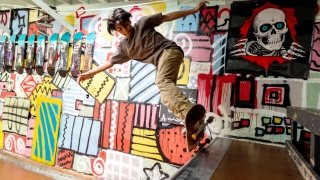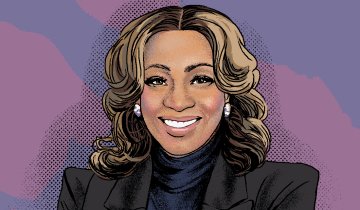This interview includes a brief discussion of suicide and suicide ideation. If you or someone you know is experiencing suicidal thoughts or a crisis, please reach out immediately to the Suicide Prevention Lifeline at 800-273-8255.
I lived half of my days as a boy during my teenage years and after school hours due to not being comfortable with the limitations placed on girls and women solely based on their gender (you can read more about my experiences in this article on The Tomboy Hypothesis: Gender, Language Use, and the Output Filter). Shaving my head and dressing as a male allowed me to perform my daily tasks outside of home much more efficiently and liberally. The reactions other people had to my existence were also very different and much more welcoming. One of the activities that gave me the greatest sense of freedom and joy was skateboarding. So when I heard about the USC Skate Studies, I had to know more about the project and reached out to USC Rossier Research Professor Zoë Corwin, the principal investigator of the studies.
Nooshan Ashtari: Thank you so much for your time and your work on the USC Skate Studies. Could you tell us about the study and how the project started?
Zoë Corwin: The USC Skate Studies project was launched by a grant from the Tony Hawk Foundation (now rebranded as the Skate Park Project). They’ve built over 600 skate parks across the United States, and their board members wanted to learn more about the young people who use those parks and how they can serve them better. They had collected some data internally as a foundation, but this would be the first formal research project of its kind. As a first step, our research team—Neftalie Williams, Tattiya Maruco, Maria Romero-Morales, Christine Rocha, Robert Reichardt and several amazing undergraduate researchers—launched a national survey.
We reached out to skateboarders across the United States through social media and garnered support from a diverse group of skateboarders—including Tony Hawk—who made a video inviting skaters to take the survey. We sent out hundreds of cards with QR Codes that people could scan to skate shops and non-profits across the United States, and we ended up with over 5,000 responses, about 2,500 in the demographic we were looking for which was between the ages of 13 and 25. Then we conducted seven case studies in different parts of the country, where we tried to learn from skateboarders from diverse backgrounds such as Latinx, Black and Native American skaters, as well as skaters who live in urban and rural areas.
We were intentional about talking to skaters in different communities and then to people who supported them, like advocates or allies in the skate community, ranging from community members and skate shop owners to city officials and police officers.
NA: What were some of the main findings of your study? What are some of the effects of skateboarding on physical, mental and community well-being based on the results of your research?
ZC: We learned a lot from the people we interacted with and through the survey results. We had very interesting findings around race, which was one of the things that we were intentional about focusing on because we knew that the skateboarding community is incredibly diverse but it’s not often represented as such. We learned from racially minoritized survey and interview participants that they felt safer within the skate community than they do navigating predominantly white spaces. We learned a lot about how skateboarders tend to be very good at cross-cultural and intergenerational communication. So there’s a lot of cool things that happen in the skate community that break down a lot of the barriers that the rest of us struggle to navigate.
We also learned a lot about how skaters collaborate with each other. Mental health became a big theme. The skaters talked a lot about the community that they found, and how they found ways to practice both self care and community care through skating. The amazing thing about that first study was that it was well received in the skate community. If you go to a skateboarder, they already know all the incredible facets of skateboarding, but they’ve also likely faced lots of negativity around skating, and have never seen an academic institution highlight the value of skateboarding.
Take our survey finding about why people skate. The number one reason people gave was that “skateboarding is fun.” That finding comes as no surprise to skaters. But once you start pairing that finding with all of the statistics around suicide ideation, suicide, depression and obesity, especially in low income/high poverty neighborhoods where young people have to navigate poverty in addition to racism and sexism in some situations, the fact that they’re finding ways to have fun is really powerful. So that became one of the things that we were most excited about; learning from these skateboarders who are often marginalized and stigmatized, and yet are still choosing to skate. I believe we, as a broader society, can learn from these skaters.
NA: Were there any findings about the intersections and the perceptions of gender and gender identity/representation and skateboarding? How about the intersections of language/language use and skateboarding?
ZC: [When you’re a skater] and you see someone who skates—they’re dressed like a skateboarder, holding a skateboard—and you’re nodding at that person. You’re connecting with that person, not needing to actually speak with them. So there is an unspoken language or way to connect wherever you go in the world because you skateboard. I don’t know how many other activities are like that. I’m not thinking so much about what’s spoken, but rather skaters are able to read someone as a skater. They’re easily able to drop into a skate scene [anywhere], and don’t actually have to speak the language to connect, which is really powerful. And then there’s the aesthetic and artistic expression that comes with skateboarding— that’s really cool.
Something that’s been interesting is that skateboarding entered the Olympics after our data collection for the first study was done. Skateboarding as an Olympic sport has been rather controversial in the skate community, because the Olympics puts skateboarding into the mainstream, but it is also exciting because now you have a global audience for skating. And then you start to see skating in commercials or social media.
In a second study–Mattering in the Margins (LA study)–we did about the intersection of skateboarding, community and mental health in Los Angeles, women and queer L.A. skaters told us about how they are building radically inclusive spaces in the skate community. In response to gatekeeping based on skill and in some instances, some toxic masculinity in skate parks, they are forging communal spaces to skate. Sometimes it’s dangerous to skate in a place where everyone’s really strong. But there's a lot of queer and women meetups in all different places, and those places are super inclusive.
We heard from people who are leading these new spaces that they’re not even bothered by the other spaces anymore. Instead they are really proactive in envisioning the community they want and making it happen, and finding a lot of solace in those communities. That has been compelling to document.
NA: I agree. Skateboarding brought so much solace and freedom to me. What were some of the challenges you faced while conducting the research?
ZC: Well, one of the challenges was where does this work fit in? Because when sharing our research at an educational conference they might ask, “Why focus on skateboarders?” So it is challenging to help people understand why skateboarders are a valuable population to study and learn from, despite the fact that skateboarding is a massively growing activity. In terms of access, there’s easier access to skateboarding than a lot of other sports. And there’s an interesting dynamic that happens when young kids step out of team sports around 12 or 13. A lot of them then go into skateboarding. So there’s definitely a lot of value in looking at this specific activity. Yet, maybe people don't fully understand that value. I think that’s changing now that skating is in the Olympics.
My colleague, Neftalie Williams, who was at USC and is now a faculty member at San Diego State University where they have a critical mass of people working on action sports, is conducting trailblazing research around skateboarding. He’s done a lot of work to change the dynamics around how non-skaters view skateboarders. The current book he's working on is a history of BIPOC skaters and female skaters since the inception of skateboarding. He’s highlighting and amplifying the people who have been in the mix since the beginning, but haven’t been highlighted like they deserve. I’m very grateful to be learning from him as he dedicates more time to that line of research.
NA: The studies sound fascinating. How about the future? What are your plans for continuing this work?
ZC: I’d actually love to run the survey again. I think [enough time has passed], and we’ve had a pandemic and the Olympics, so I think it would be a good time to capture new perspectives through the survey. [We] just need the funding to do that. I also would love to expand the participatory action research project we did as we learned so much from the skaters who participated. One idea in particular is to create wellness pop-ups that resonate with youth inspired by Colombian escuchaderos (listening centers stationed in public spaces) that can be situated in skateparks and other communal spaces–that would provide access to wellness resources for skaters and others. This has been such a fun spark to my career because I’ve been doing research in college access and success for decades now, and so to have something new that really pushed me to think differently and do research differently was really uplifting. I feel so fortunate that I’ve gotten to interact with and learn from the skate community—it has been inspiring.






